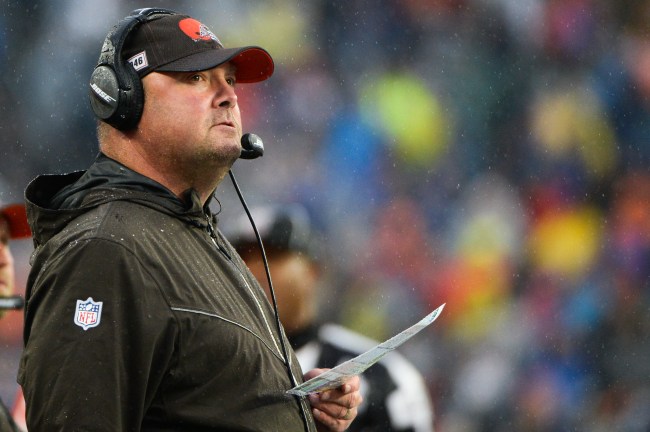
Kathryn Riley/Getty Images
If you didn’t catch the 27-13 Patriots win over the Browns on Sunday, your brain escaped being tied up in a figure-eight knot by the buffoonery of Browns coach Freddie Kitchens.
(Oh yeah, and you missed this.)
Put it in the Browns HOF pic.twitter.com/OBtZOYWBrJ
— Busted Coverage (@bustedcoverage) October 27, 2019
Moving on. Back to Kitchens. Let me set the scene.
There’s 6:17 left in the game with the Browns down 27-10. The Browns’ offense was faced with a 4th-and-11 and were positioning to punt when they were called for a false start, pushing them back five yards into a 4th-and-16 situation from their 19 yard line.
Kitchens then made the mind-melting decision to send his offense back onto the field to go for it on 4th-and-16, a tactic he decided against on 4th-and-11. 2+2 = 5.
Baker Mayfield was then sacked and Cleveland turned the ball over on downs to the Patriots.
Try to follow this logic:
So false start in 4th & 11, with punt unit, Freddie pulls them puts offense out for 4th & 16. Baker sacked. Nathan Zegura just reported, #Browns deliberately false started so the offense could return to the field because Kitchens didn't want to burn final timeout. Clown show.
— Daryl Ruiter (@RuiterWrongFAN) October 27, 2019
Kitchens spoke about his decision after the game, providing zero rational clarity.
“I didn’t want to use the timeout and I wanted to go for it,” he said after the game. “We had half of our guys running off, half of our guys running on and I wasn’t giving up right then by punting the ball to them. The only chance that we had was to convert for a (first) down and then we didn’t. The defense’s job is to go out there and stop them and they did, so it gave us a chance. I was still trying to win the game.”
Rex Ryan was absolutely appalled that a professional coach would ever make a decision this outlandish.
Rex Ryan did not mince any words talking about Browns HC Freddie Kitchens and his questionable decisions… pic.twitter.com/oQVnVPyfAR
— UNSPORTSMANLIKE Radio (@UnSportsESPN) October 28, 2019
The internet was not much kinder.
Browns HC Freddie Kitchens trying to get fired. Punt unit is on the field for 4th&11, whistled for false start, it’s now 4th&16. Freddie brings offense bck on the field to for it on his own 30. Sack, turnover on dwns. WTF was that Freddie?
— shannon sharpe (@ShannonSharpe) October 27, 2019
Freddie Kitchens: #browns #CLEvsNE
4th and 11 4th and 16
Punt Go for it! pic.twitter.com/onWXiBJdc4— Browns Rally Possum (@BrownsRally) October 27, 2019
Freddie Kitchens ready to answer on offense tho…. pic.twitter.com/9u7hloKBGz
— McNeil (@Reflog_18) October 27, 2019
Freddie Kitchens was in his bag today 🔥🔥🔥🔥
13 penalties
6 false starts
3 turnovers
2 failed challenges
Terrible Play call
Goes for it after the penalty in the punt team
2 weeks to prepare
Terrible clock management27-13 loss 🔥🔥🔥🔥 pic.twitter.com/imjK4C6fev
— Browns Country (@TheFanDomeShow) October 27, 2019
Fourth-and-11 from own 14: Line up to punt
*False start penalty
Fourth-and-16 from own 19: Call offense back on field to go for it.
Life with Freddie Kitchens as your coach.
— Ryan Hannable (@RyanHannable) October 27, 2019
Per source, #Browns HC Freddie Kitchens ruled out for remainder of game (brain)
— Browns Beat Toaster (@BrownsToaster) October 27, 2019
Freddie Kitchens seems like a nice fellow but I wouldn’t hire him to coach Lyndhurst Middle School.
— Sam Amico (@AmicoHoops) October 27, 2019
Tony Romo trying so hard to not call Freddie Kitchens a fucking moron is the only entertaining part about this game
— Dave Lane (@daveydavelane) October 27, 2019
Hey Freddie, don’t take it personally. Teams become confused when the play the Patriots. It could always be worse.
https://twitter.com/FBForL/status/833489831598632961?s=20